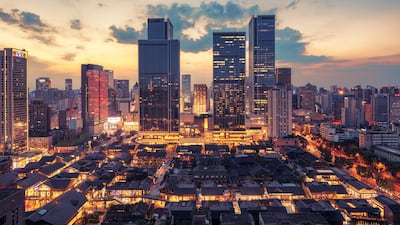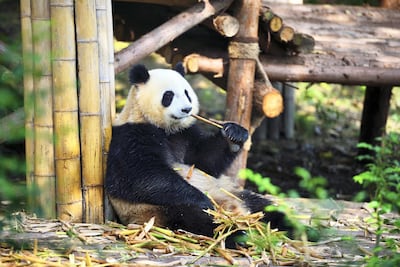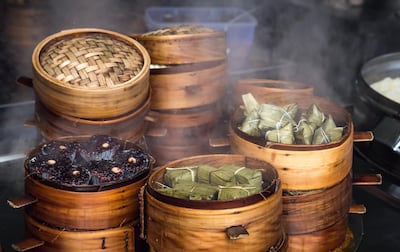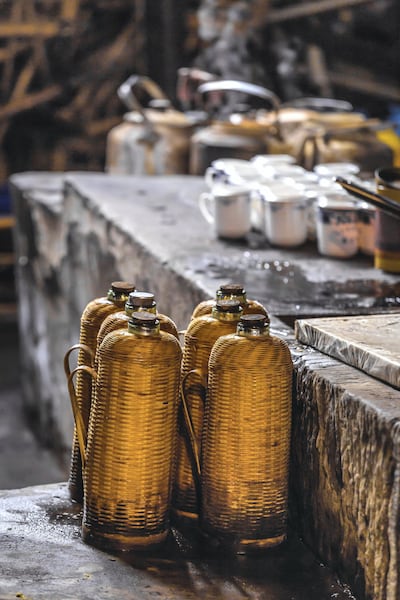Chengdu is a city of 14.4 million people who are as chilled as the pandas that put it on the tourist map. This laid-back vibe has long attracted young people and, today, Chengdu is as famous for a hip-hop group named after an appliance maker as it is for spicy dishes and tea houses. So, how to do the 'Du? The best advice was penned 1,100 years ago by a man raised near Chengdu, the renowned bard Li Bai: "Life in the world is but a big dream. I will not spoil it by any labour or care." This is a city where tea is not served by the cup but by the flask, so take it slow.
9am: Meet the pandas
If you’re in Chengdu, chances are you have come for the pandas. The Chengdu Research Base of Giant Panda Breeding is 20 minutes north of central Chengdu. Pandas are active early morning, so start at the top of the base and gradually make your way down to the red pandas. The centre has a successful breeding programme, but pandas are seldom reintroduced to the wild, so it can feel like a shrine to panda consumption rather than conservation. Given pandas are rapidly losing habitat to industrialisation, tourists should give pause before buying panda merchandise. Entrance is Dh30 and the centre is open from 7.30am to 6pm. An alternative: head to the Chengdu Museum New Hall on Tianfu Square for a history of Chengdu through the dynasties. Admission is free. Doors open at 9am.
11am: Wander in Wu Hou
At the Wu Hou Temple, larger than life statues built over the centuries honour warlord Liu Bei and those who helped found the Shu Kingdom in 221 AD. Each of the 47 effigies has a biography noting accomplishments and cause of death – usually violent. One tells of a man so overworked he died of exhaustion in his tent on the front lines in 234 AD. The complex has expansive evergreen gardens, koi ponds, stone bridges and pathways canopied by two-storey bamboo. Don't miss the exquisite Bonsai garden. Entry is Dh27.
1pm: Lunch at Jin Li Street
Exit the temple and you will be near the back of Jin Li Street, at its food market. See why Chengdu was the first Asian city designated as a Unesco City of Gastronomy by sampling dishes such as Bobo chicken skewers, jackfruit and cream sponge cakes, marigolds encased in edible globules of glutinous rice, and peppered duck or rabbit head, a Chengdu speciality. Most snacks cost from Dh5 to Dh14. Prices are marked in English. Craving something familiar? Ma yuan are a chewy, Chinese cousin of luqaimat made from rice and coated in red sugar glaze. Crispy, kunafa-like pancakes called longxubing are filled with date paste, coconut paste or mince.
2pm: Experience pandaroma
Wander through Jin Li Street, modelled on Qing Dynasty architecture. Do a little retail therapy or catch a performance of Sichuan face-changing opera at one of the many cafes where performers switch masks with each flick of the hand. Touristy? Absolutely. But most tourists are from elsewhere in China and it's a distinctly Chengdu scene. This is perhaps the only place in the world where it's acceptable for adults to wear panda-ear headbands as daywear – and they do. To my right, a mother puts furry panda nunchucks around the neck of her toddler. To my left, a girl strokes her boyfriend's chest with panda-claw mittens.
3pm: People-watch at People’s Park
Two women waltz in silence under a Monument to the Martyrs of the Railway Protection Movement. A fitness group performs aerobics under evergreens. A calligrapher dips a giant sponge brush in water and scrolls in Chinese and English on the pavement. Parents post summaries of children’s accomplishments on to a fence to find a suitable spouse. The park is the best place to see Chengdu at rest and play.
3.30pm: Clean your ears
At the edge of the park’s pond is Heming Teahouse. Trilling fills the air, not from the delicate rattle of teacups, but from tongs striking metal. This is another Chengdu speciality: ear cleaning. Men in headlamps brush between tables with palm-sized menus offering a selection of earwax cleaning services. Within a few minutes of settling into a bamboo chair, a man approaches me and asks in English: “Ear?” He turns on his headlamp, tilts my head and peers deep inside, as if staring into a mineshaft. I ask for the whole shebang. It seems to end quickly with a few firm swipes, but, alas, that is only round one. A few drops of liquid percolate into my ear and a thin metal stick is inserted and hammered with tongs. Vibrations rattle through me. It isn’t unpleasant.
4.30pm: Sip slowly
A 10-minute walk north of People’s Park is Kuan and Zhai Alley, a restored historic district of boutique hotels and high-end tea houses with fanciful, contemporary decor. At Monde, a selection of local teas can be ordered by the gram (Dh20 for four grams) and enjoyed in a whimsical garden with life-size animal sculptures. A guitarists plays. Tourists step into the atrium for selfies. The teahouse is elegant, but relaxed; boys across from me smoke casually, legs crossed in their chairs, playing cards.
7.30pm: Heat up
No visit to Chengdu is complete without hot pot. Thin slices of beef, slabs of fish, enoki mushrooms and leafy greens are plopped into a communal vat of boiling water and cooked instantly. Choose between a clear broth base or a red broth spiced with dried chillies, Sichuan peppercorns, anise, cinnamon, ginger, garlic, fennel and cardamom. Expect your eyes to water and your tongue to swell. Hot-pot restaurants are found throughout the city.
9.30pm: Take it higher
Chengdu is the hip-hop capital of China. The Sichuanese dialect lends itself to the genre, but Chengdu has pulled in artists from every corner of China thanks to its reputation as a city that lives in the moment and welcomes outsiders. Higher Brothers, a group whose name is inspired by Chinese appliance maker Haier, are the city's biggest export, and celebrate everyday aspects of Chengdu life, from hot sauce to WeChat. Young hotel staff will have suggestions for live shows. If hip-hop is not for you, head to Lan Kwai Fong, where high-end venues by the Jinjiang River have something for every taste. Salseros fill the streets on Sunday nights. Farther on, you will find big bands at American-style restaurants, a cosy cafe serenaded by an acoustic guitarist, and nightclubs blasting EDM where well-coiffed young men challenge each other to dance-offs.
Rest your head
Rooms at the Shangri-La Chengdu (www.shangri-la.com) offer views of the Jinjiang and cost about Dh450 per night. This central hotel is a five-minute walk from the Corniche and Lan Kwai Fong.
Getting there
Etihad (www.etihad.com) flies from Abu Dhabi to Chengdu Shuangliu International Airport every Sunday, Tuesday and Friday, with return tickets from Dh3,000. The flight takes six hours and 50 minutes.
______________________
Read more:
The Smart Shopper: how to bag a luxury bargain in Beijing
Destination China: visa-free travel from the UAE to these six cities and beyond
Hotel Insider: The Peninsula Beijing
Bigger and better in Beijing, China
______________________




